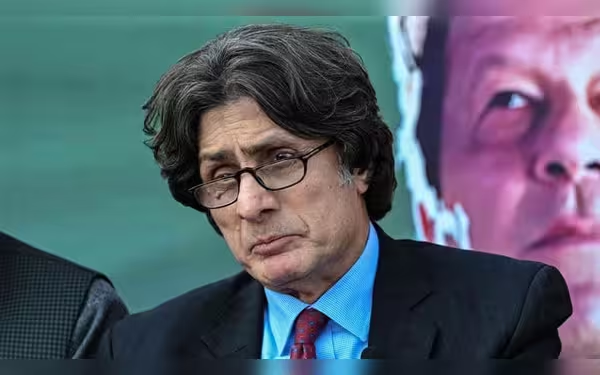Sunday, November 24, 2024 10:37 PM
PTI Leader Raoof Hasan Confirms Ongoing Negotiations with Establishment
- Raoof Hasan claims PTI negotiations with establishment continue.
- Interior Minister denies talks, but Hasan insists otherwise.
- PTI plans protest on November 24 to advocate for dialogue.
 Image Credits: geo
Image Credits: geoRaoof Hasan of PTI asserts ongoing negotiations with the establishment, despite government denials, emphasizing the need for dialogue and upcoming protests.
In recent developments, the political landscape in Pakistan has been marked by ongoing discussions between the Pakistan Tehreek-e-Insaf (PTI) party and the establishment. Senior PTI leader Raoof Hasan has publicly stated that these negotiations are still very much alive, despite contrary claims from government officials. This assertion was made during a recent appearance on Geo News' programme 'Naya Pakistan', where Hasan emphasized the importance of these talks for the future of the country.
Hasan's comments come in the wake of Interior Minister Mohsin Naqvi's denial of any negotiations between the PTI and the establishment. In response, Hasan pointed out that the discussions are taking place with influential individuals who may not be within Naqvi's knowledge or authority. He stated, "The negotiations are with individuals who are perhaps beyond Naqvi's purview, with people who hold real influence. If Naqvi chooses not to acknowledge this, that’s his issue, not ours.” This highlights a significant divide in perceptions regarding the ongoing political dialogue.
Furthermore, Hasan reiterated that "negotiations have not ended. They’re still under way" and stressed the necessity of these discussions in light of the current challenges facing Pakistan. He remarked, "The country can’t progress without them. Everyone can see that the country is currently in trouble.” This statement underscores the urgency of the situation and the need for constructive dialogue among political factions.
In addition to discussing negotiations, Hasan addressed the PTI's right to protest, stating that the party is exercising its legal right to hold demonstrations rather than resorting to threats. He expressed confidence in the upcoming protest scheduled for November 24, asserting, "People are prepared for the protest. They want to join it. I’m in favour of dialogue. Problems should be solved at the table on a priority basis. A protest will be very effective in this regard." This indicates a strategic approach by the PTI to engage the public while advocating for dialogue.
However, the military establishment has firmly denied any involvement in the reported negotiations between the PTI and the government. A source from the establishment clarified that the army will not engage in discussions with any political party, stating, "Our position is clear that the army will not talk to any political party. It is for the political parties to talk to each other.” This statement reinforces the military's stance of remaining apolitical and highlights the need for political parties to resolve their differences independently.
In a previous press conference, the Director General of Inter-Services Public Relations (ISPR) reiterated that the army's role is strictly non-political, emphasizing that all political parties are respected but must engage in constructive politics. The DG stated, "If any political group attacks its own army, no one will interact with it. The only way for such an anarchist group is to apologise to the nation, promise to shun the politics of hatred and do constructive politics." This statement serves as a reminder of the delicate balance between military and political relations in Pakistan.
As the situation unfolds, it is clear that the path forward for the PTI and other political parties lies in dialogue and cooperation. The ongoing discussions, protests, and the military's firm stance all contribute to a complex political environment. For the citizens of Pakistan, the hope remains that these negotiations will lead to a resolution that fosters stability and progress in the country. The importance of constructive dialogue cannot be overstated, as it is essential for addressing the pressing issues that Pakistan currently faces.













